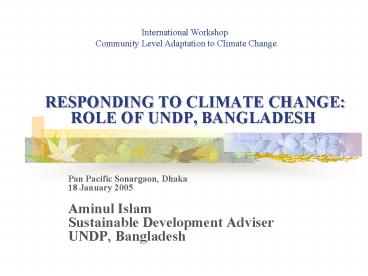RESPONDING TO CLIMATE CHANGE: ROLE OF UNDP, BANGLADESH - PowerPoint PPT Presentation
1 / 11
Title:
RESPONDING TO CLIMATE CHANGE: ROLE OF UNDP, BANGLADESH
Description:
Policy change & institutional strengthening for natural disaster risk management ... Otherwise it may be too late to avoid disasters. ... – PowerPoint PPT presentation
Number of Views:129
Avg rating:3.0/5.0
Title: RESPONDING TO CLIMATE CHANGE: ROLE OF UNDP, BANGLADESH
1
RESPONDING TO CLIMATE CHANGEROLE OF UNDP,
BANGLADESH
International Workshop Community Level
Adaptation to Climate Change
- Pan Pacific Sonargaon, Dhaka
- 18 January 2005
- Aminul Islam
- Sustainable Development Adviser
- UNDP, Bangladesh
2
Bangladesh has one of the most densely populated,
low lying coastal zones in the world, with 20-30
million people living within 1 meter elevation
from the high tide level. They are likely to be
affected by climate change. This is larger than
the population of all the small island developing
countries (Maldives, Fiji, Tuvalu put
together). Such a low lying country, funnel
shaped coast exposing the land to cyclones, storm
surges, seasonal flooding and drought,
salinization, widespread poverty, large
population base and poor institutional
development have made Bangladesh most vulnerable
to climate change.
Why Worry about Climate Change?
3
Having Special Care for Climate Change Issues
UNDP Supported Projects/ Programmes in Bangladesh
- MITIGATION ORIENTED
- Sustainable Energy Programme
- Clean Development Mechanism
- Energy Efficient Kiln for Brick Making Industries
(GEF) - CNG Conversion Technology Promotion (GoB and
DANIDA) - Institutional Strengthening for Ozone Depleting
Substances Phase-out (Montreal Protocol) - ODS Recovery and Recycling (MP)
- Refrigerant Management Plan (MP)
- National ODS Phase-out Plan (MP)
- ADAPTATION ORIENTED
- National Action Plan for Adaptation to Climate
Change (GEF) - Sustainable Environment Management Programme
(SEMP) components on Barind Dry Area Ecosystem
Restoration, Floodplain Resource System, Brackish
Water Resource Management, Institution Policy
Support Unit (IPSU), SDNP - Coastal Wetland Biodiversity Management (GEF)
- Biodiversity Strategy and Action Plan (GEF)
- Comprehensive Disaster Management Programme (UNDP
DFID) - Empowerment of Coastal Fisher Community for
Sustainable Livelihood - Bio-technology policy Formulation
4
(No Transcript)
5
Formulation of the Bangladesh Programme of Action
for Adaptation to Climate Change (NAPA)
- Development of a countrywide program that
encompasses the immediate and urgent adaptation
activities that address the current and
anticipated adverse effects of climate change,
including extreme events. - Provision of a framework for coordination and
implementation of adaptation initiatives through
a participatory approach. - Building synergies with other relevant
environmental and related programs. - Develop a specific priority program of action
for adaptation to climate change - Address the need to develop a realistically
achievable country-driven program of action made
up of priority activities
6
Community Need based Responses
- Establishing Horizontal and Vertical Linkages
with focus on ecological site specific community
level need assessment and accordingly informed
decision/ policy response - Empowering Community for Sustainable Livelihood
at the vulnerable regions - Developing an overall framework and more
effective approach to facilitate climate change
adaptation across sectors - Bringing key partners at the fore front on
activities and knowledge, and translating
scientific information for policy makers. - Developing long term broad based institutional
common platform for public-private partnership to
integrate climate change in development
activities. - Process documentation of community level
adaptation and field based RD / Action Research
which can inform national work and international
negotiations. - Raising public awareness by enhancing the
currently limited capacity of the media and NGOs
involved in communication to disseminate climate
messages.
7
Climate Cell Sub-components within the Frame of
Comprehensive Disaster Management Programme
- Improving Coordination
- Building the capacity of MoEF/DoE and other key
Ministries to coordinate and mainstream climate
change issues in development activities.
2. Strengthening Knowledge Collating and
synthesising existing knowledge on impact
prediction and adaptation to climate change
commissioning research to fill key gaps 3.
Raising Awareness and Adapting Activities Awarene
ss-raising, advocacy and coordination to promote
climate change adaptation and risk reduction in
development activities
8
1. Improved Coordination and Mainstreaming
- Establish Climate Cell and Technical Advisory
Group with linkages to other CDMP sub-programmes,
MDMR and other line agencies - Strengthen the capacity of Climate Cell to
coordinate and provide leadership on climate
change, nationally and internationally - Establish mechanisms for coordination and
information sharing with other Ministries
9
2. Strengthening existing knowledge and
information accessibility on impact prediction
and adaptation
- Establish mechanisms for accessing and analyzing
current knowledge on impact prediction and
adaptation - Address priority gaps in current knowledge by
commissioning short research projects - Develop PRECIS and CLASIC projects developed to
meet countrys needs and results disseminated and
used for policymaking and as a basis for further
research
10
3. Awareness-raising, advocacy and networking
to promote climate change adaptation and risk
reduction in development activities
- Develop and implement strategy for awareness
raising and advocacy on climate change issues - Establish mechanisms for promoting climate risk
reduction and adaptation (Climate change network
Partnership coordination, target Ministries,
donor coordination, tools and checklist
development) - Capacity building and training programmes on
climate change designed and established for civil
service and grassroots leaders (Civil service
training Programme, grassroots training)
11
Development of effective adaptation strategies
requires community participation in impact
assessment, response strategy development and
recognition of multiple stresses on sustainable
management of resources. Since early signs of
climate change already have been observed and may
become more prominent over time, it is time to
take measure to design and implement adaptations.
Otherwise it may be too late to avoid disasters.
This international Forum can do a lot in
awareness building or giving a wake up call to
take available precautionary measures.
Wake UP Call !






























